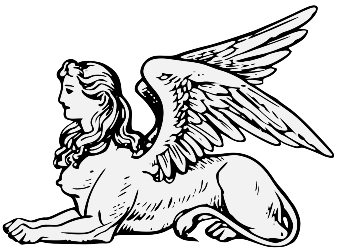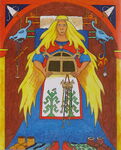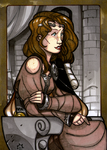Fulla (Old Norse: [ˈfulːɑ], possibly "bountiful") or Volla (Old High German, "plenitude") is a goddess in Germanic mythology. In Norse mythology, Fulla is described as wearing a golden band and as tending to the ashen box and the footwear owned by the goddess Frigg, and, in addition, Frigg confides in Fulla her secrets. Fulla is attested in the Poetic Edda, compiled in the 13th century from earlier traditional sources; the Prose Edda, written in the 13th century by Snorri Sturluson; and in skáldic poetry. Volla (Folla) is attested in the "Horse Cure" Merseburg Incantation, recorded anonymously in the 10th century in Old High German, in which she assists in healing the wounded foal of Phol and is referred to as Frigg's sister. Scholars have proposed theories about the implications of the goddess.
Etymology[]
The Old Norse name Fulla has been translated as 'bountiful'.[1] It stems from Proto-Germanic *fullōn ('fullness, plenitude'; cf. Gothic fullo 'fullness', OHG folla 'plenitude'), itself a derivative of the adjective *fullaz ('full'; cf. ON fullr, Goth. fulls, OHG foll, all meaning 'full'). The latter derives from Proto-Indo-European *plh₁-nó- ('filled, full'; cf. Skt pūrṇá 'full', Lith. pìlnas, OCS plьnь 'filled, full'), a past participle of the verbal root *pelh₁- ('to fill').[2]
Gallery[]
Videos[]
References[]
- ↑ Orchard, Andy (1997). Dictionary of Norse Myth and Legend. Cassell. ISBN: 978-0-304-34520-5 .
- ↑ Orel, Vladimir E. (2003). A Handbook of Germanic Etymology. Brill. ISBN: 978-90-04-12875-0 .



